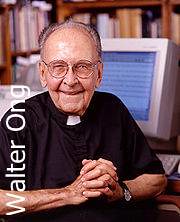Duluth, Minnesota (OpEdNews) May 2, 2024: My favorite scholar is my former teacher at Saint Louis University, the American Jesuit Renaissance specialist and cultural historian and pioneering media ecology theorist Walter J. Ong (1912-2003; Ph.D. in English, Harvard University, 1955). In my adult life (I turned 80 recently), I have devoted an enormous amount of time and energy to writing about Ong's mature work from the early 1950s onward.
For example, I have written about his account of our contemporary secondary oral culture in my essay "Secondary Orality and Consciousness Today" in the anthology Media, Consciousness, and Culture: Explorations of Walter Ong's Thought, edited by Bruce E. Gronbeck, Thomas J. Farrell, and Paul A. Soukup (Sage Publishing, 1991, pp. 194-209).
Now, I recently learned about Hartmut Rosa's 2019 book Resonance: A Sociology of Our Relationship to the World, translated from the German by James C. Wagner (Polity; orig. German ed., 2016).
For Prof. Dr. Hartmut Rosa (born in 1965; Ph.D., Humboldt University of Berlin, 1997; with a dissertation on the political philosophy of Charles Taylor), his 2019 book Resonance is a follow up to his 2013 book Social Acceleration: A New Theory of Modernity, translated by Jonathan Trejo-Mathys (Columbia University Press).
In Rosa's "References" in his book Resonance (pp. 504-528), he lists seven works by Taylor (p. 526). According to the "Index" (pp. 529-554 at 552), Rosa discusses Taylor on pages 20, 33-34, 88, 111, 115-117, 126, 133-138, 188, 198, 365, 391-392, and 413.
Now, what Rosa and others refer to as modernity emerged in our Western cultural history after the Gutenberg printing press emerged in Europe in the mid-1450s. Ong discusses the emergence of the Gutenberg printing press in his massively researched 1958 book Ramus, Method, and the Decay of Dialogue: From the Art of Discourse to the Art of Reason (Harvard University Press). The French Renaissance logician and educational reformer and Protestant martyr Peter Ramus (1515-1572) was a prolific and influential writer in his day.
Ong's massively researched 1958 book is his pioneering study of the print culture that emerged in our Western cultural history after the Gutenberg printing press emerged in Europe in the mid-1450s.
Othe pioneering studies of print culture in our Western cultural history include the following four books:
(1) Richard D. Altick's The English common Reader: A Social History of the Mass Reading Public, 1800-1900 (University of Chicago Press, 1957);
(2) Lucien Febvre and Henri-Jean Martin's The Coming of the Book: The Impact of Printing, 1450-1800, translated by David Gerard; edited by Geoffrey Nowell-Smith and David Wootton (Verso, 1976; orig. French ed., 1958);
(3) Jurgen Habermas' The Structural Transformation of the Public Sphere: an Inquiry into a Category of Bourgeois Society, translated by Thomas Burger with the assistance of Frederick Lawrence (MIT Press, 1991; orig. German ed., 1962);
(4) Marshall McLuhan's The Gutenberg Galaxy: The Making of Typographic Man (University of Toronto Press, 1962; for specific page references to McLuhan's discussion of Ong's publications about Ramus and Ramist logic, see the "Bibliographic Index" [pp. 286-287]).
Now, in the opening of Rosa's 2019 book Resonance, he says, "If acceleration is the problem, then resonance may well be the solution. This is the most concise formulation of the central thesis of this book, and it signals two important fundamental insights. First, the solution is not deceleration. . . . Second, if deceleration is not the solution, this also means that the problem must be defined more precisely. Modern societies [in the western world] are characterized by systematic changes in temporal structures for which acceleration may serve as a blanket term. I defined acceleration in my previous book, Social Acceleration, as growth in quantity per unit of time, which makes clear that we are dealing here with comprehensive processes of increase" (p. 1; his italics).
Rosa then goes on to discuss "the three great crises of the present day: [1] the environmental crisis, [2] the crisis of democracy, and [3] the psychological crisis (as manifested, for example, in ever-growing rates of burnout). The first indicates a disturbance in the relationship between human beings and our non-human environment or nature; the second a disturbance in our relationship to the social world; and the third a pathological disorder in our subjective relation to the self" (p. 2). Comprehensive, eh?
(Note: You can view every article as one long page if you sign up as an Advocate Member, or higher).





